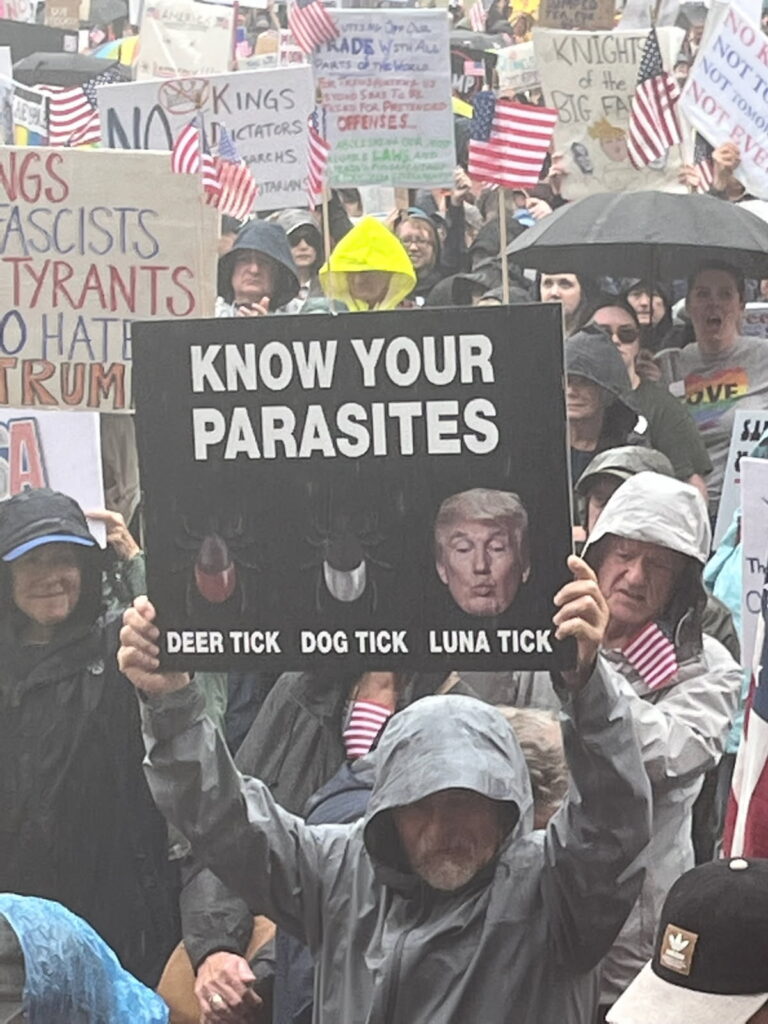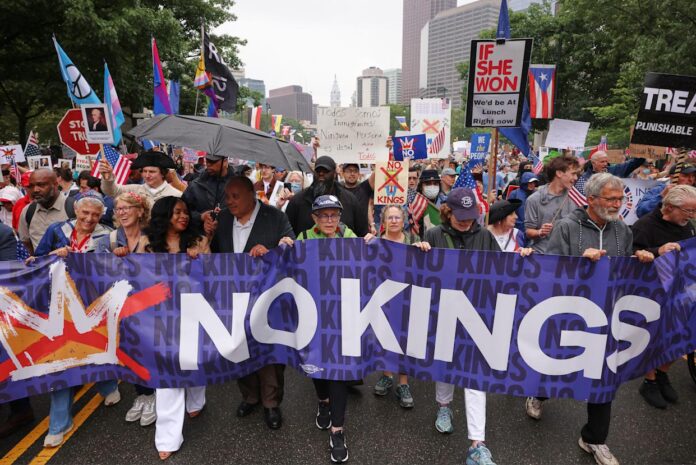On a recent Saturday, under a persistent New Jersey sky, a powerful wave of protest swept across our state, echoing sentiments of liberty and democratic defiance. These were the “No Kings” protests, varied in their scale and location, but united by a singular, resounding message: a rejection of authoritarian spectacle and a reaffirmation of American ideals. While the demographics of the participants leaned notably female, white, and of an older generation, their passion and conviction transcended any single demographic, representing a deep-seated commitment to the principles our nation was founded upon.
One of the most significant gatherings took place in historic Morristown, a town deeply etched in the annals of the American Revolution. Here, thousands converged, their collective presence a testament to the enduring spirit of citizen engagement. The air, though damp with rain, crackled with a palpable energy as signs bearing messages of freedom and dissent bobbed above the crowd.

Mikie Sherrill, the newly minted Democratic nominee for governor, took to the stage, her voice resonating with the historical significance of Morristown. She spoke of the town’s pivotal role in our nation’s birth, reminding everyone of the time when Americans first refused to be governed by a king. Her address then shifted to the present, acknowledging that all eyes would be on New Jersey this fall as the gubernatorial election approaches.
Then, a moment of profound significance unfolded. Mid-sentence, Sherrill paused, a smile gracing her lips. “I just saw something that kind of made me smile,” she shared, “because you may remember that there has only been one female governor of the entire state of New Jersey. And she’s actually standing right here.”
Indeed, standing just thirty feet from the podium, amidst the rain-clad crowd, was none other than former Governor Christie Whitman. The 78-year-old former Republican governor, almost unrecognizable in her practical raincoat and cap, was beckoned to the stage. Her presence was a powerful symbol of bipartisan concern for democratic norms. When asked about her motivation for braving the elements, Whitman’s response was immediate: the military parade scheduled in Washington, a spectacle she unequivocally labeled “outrageous.” Whitman, whose moderate Republican views often place her at odds with the current direction of the party, had previously endorsed Sherrill for governor, further underscoring the broad appeal of the “No Kings” message.
These statewide “No Kings” rallies were largely catalyzed by the planned parade in Washington, D.C., coinciding with a former president’s birthday and the formation of the American army. Critics across the spectrum voiced deep concerns, seeing such a display of military hardware parading through a nation’s capital as more akin to the practices of authoritarian regimes than a vibrant democracy. Amallia Duarte, Chair of the Morris County Democrats, articulated this sentiment, noting that the event was perceived as a “45 million dollar parade to celebrate himself.”
Former Congressman Thomas Malinowski, addressing the Morristown crowd, drew a poignant contrast, recalling the nation’s bicentennial celebration in 1976. That momentous occasion, he reminisced, was not marked by the rumble of tanks but by the graceful “parade of tall ships on the Hudson,” a testament to peaceful celebration and shared heritage.
The Morristown rally itself was a testament to dedication. Despite the steady downpour that began at 10 a.m., crowds swelled, filling the town hall lawn and the closed-off South Street. The rain did little to dampen the spirits of those who gathered, showcasing a deep commitment to their cause.
Earlier that morning, a smaller, equally passionate gathering took place about half a mile away, at a park statue honoring Thomas Paine. An organizer at this initial rally reminded the damp attendees of Paine’s condemnation of “Sunshine Patriots,” a sentiment that resonated powerfully in the current political climate.
While the parade and its perceived implications were a primary focus, the upcoming election was also a significant topic of discussion. Mayor Tim Dougherty, invigorated by the sheer size of the crowd, emphasized the critical need for this passion to endure beyond a single day, transforming into sustained civic engagement. Attendees were urged to maintain a peaceful demeanor and avoid engaging with any potential counter-demonstrators. Fortunately, none were present at the rally itself. As the event concluded, a vehicle adorned with political flags was observed driving around town, but aside from some reciprocal yelling, no incidents were reported, preserving the peaceful nature of the protest.
The “No Kings” demonstrations, particularly the robust turnout in Morristown, underscored a vital aspect of New Jersey’s political landscape: a robust and engaged citizenry committed to upholding democratic principles.
South Jersey’s Stand: A Powerful “No Kings” Rally Unites Communities on Haddon Avenue
Under a sky brimming with conviction, thousands of South Jersey residents recently transformed Haddon Avenue into a vibrant corridor of democratic expression. From Haddon Township to Collingswood, a mile-and-a-half stretch between PATCO stations became the backdrop for a powerful “No Kings” rally, echoing similar protests that resonated across the nation. This wasn’t just a local gathering; it was a testament to the deep-seated spirit of civic engagement that pulses through our communities.
The air was electric with purpose as individuals and families, spanning generations, converged. They walked with determination, their footsteps a collective rhythm of dissent and hope. Handmade signs, each a unique declaration, bobbed above the crowd, proclaiming messages of justice, equality, and a fervent call for accountability. The sheer volume of participants transformed the familiar streetscape, painting it with the colors of unity and shared belief.
What spurred this remarkable turnout? The “No Kings” rallies, as they were dubbed, emerged as a nationwide response to concerns regarding the policies and rhetoric emanating from the Trump administration. For many, it was a moment to reaffirm fundamental democratic principles and voice their anxieties about the direction of the country. In South Jersey, this translated into a compelling display of organized yet organic protest, demonstrating that even local communities can rise to meet national challenges with unwavering resolve.
The choice of Haddon Avenue as the focal point was particularly symbolic. This bustling artery connects diverse neighborhoods and serves as a vital pathway for daily life in our region. By utilizing this central thoroughfare, organizers not only facilitated access for a broad swathe of the population but also ensured maximum visibility for their message. The sight of thousands peacefully marching and gathering along a typically bustling commercial street sent a powerful, undeniable signal.
Beyond the sheer numbers, the rally was characterized by a palpable sense of community and shared purpose. Conversations flowed freely as participants connected with neighbors, friends, and even strangers who shared their concerns. There was a quiet dignity in the way people conducted themselves, a clear demonstration that their passion was rooted in thoughtful consideration rather than fleeting emotion. This wasn’t just a protest; it was a gathering of like-minded citizens asserting their voice in the democratic process.
For those who participated, the “No Kings” rally on Haddon Avenue was more than just an event; it was an experience. It was a reaffirmation of the power of collective action, a reminder that individual voices, when united, can create an undeniable roar. It underscored the fact that in New Jersey, civic engagement isn’t a passive activity; it’s an active, vibrant force that shapes our present and future.
This powerful demonstration in South Jersey is just one example of how residents across our state are actively participating in shaping political discourse and advocating for their beliefs.
A Resounding Chorus: “No Kings” Echoes Across South Jersey Shores
On Saturday, June 14, 2025, the spirit of democratic vigilance swept across South Jersey, manifesting in powerful “No Kings” protests that resonated from the bustling streets of Atlantic City to the scenic 9th Street Causeway in Ocean City. These were not isolated events, but rather a concerted effort, part of a nationwide movement, to voice concerns over particular political actions and send a clear message: in America, we champion the principles of liberty, not the dictates of a monarch.
In the vibrant heart of Atlantic City, residents gathered, their collective presence a testament to the enduring power of community activism. The boardwalk, typically a scene of lively entertainment and leisure, became a platform for impassioned speeches and unified calls for accountability. The atmosphere was one of determined engagement, with participants exercising their fundamental right to assemble and express their views on matters of national importance. These gatherings were fueled by a desire to push back against what many perceive as authoritarian tendencies and to uphold the foundational democratic values of the United States.
Just a short drive south, a similar scene unfolded on the iconic 9th Street Causeway in Ocean City. Here, hundreds converged, lining the scenic stretch with an array of homemade signs and unwavering resolve. The causeway, a gateway to the beloved family resort, transformed into a powerful visual statement, with the backdrop of the bay serving as a poignant reminder of the ideals of freedom and open expression. The energy was palpable, a mix of concern and hopeful determination, as citizens from all walks of life came together to make their voices heard.
These demonstrations were directly tied to a broader national movement. The “No Kings” protests were specifically organized to coincide with a significant date: June 14th, which marked both a former president’s birthday and a planned military parade in Washington, D.C. For many participants, the lavish military display was seen not as a celebration of national strength, but as a troubling symbol of centralized power, a spectacle more fitting for an autocratic regime than a republic. The very name “No Kings” underscored this sentiment, harkening back to the American Revolution and the nation’s foundational rejection of monarchical rule.
The protests served as a reminder that political engagement extends far beyond election day. They highlighted the importance of active citizenship, where individuals and communities stand ready to defend the principles they hold dear. From the seasoned activists to those new to political rallies, a common thread of dedication to democracy wove through the crowds in both Atlantic City and Ocean City.
These events in South Jersey, much like those across the nation, emphasized a core message: the power truly resides with the people. They underscored the vitality of dissent, the importance of checks and balances, and the enduring belief in a government that remains accountable to its citizens. For those interested in understanding the nuances of political movements and how they shape our communities, and to delve deeper into discussions about governance and civic participation in New Jersey, we encourage you to visit https://explorenewjersey.org/politics/. The conversations happening on our streets are vital, and they continue to shape the very fabric of our state. From the streets of our historic towns to the broader discussions about national governance, the voices of New Jersey are clear. For more insights into the political landscape and how citizens are shaping the future of our state, explore further at https://explorenewjersey.org/politics/.












